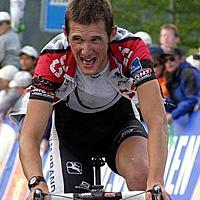
Recently on Cyclingnews.com |
An interview with Fränk Schleck, December 1, 2005
Flying high close to home
CSC rider Fränk Schleck has enjoyed an impressive 2005, taking strong results in the last few races of the season, where only the likes of Paolo Bettini and Gilberto Simoni could stop him from finishing first. The 25-year-old Luxemburger took the national jersey from teammate Kim Kirchen this year and almost made it to the podium in the Tour de Suisse, with five seconds separating himself and German superstar Jan Ullrich. This cycling revelation comes from a family with deep roots in the sport, and has found a perfect base to continue dreaming about higher goals with Danish team CSC, as he revealed to Cyclingnews' Hedwig Kröner.
Cyclingnews: Tell me about your season - 2005 has been a breakthrough year for you, with plenty of great results...
Fränk Schleck: Yes. Now that I'm back to training, having trouble starting over again, I realise how great the season really was! Although I'm only riding 2-3 hours a day, still taking it easy. It's true that I've continuously improved every year since I became a pro three years ago. This season, it started out really well with the Tour Méditerranéen, where I placed second, then I became seventh in Paris-Nice. After that I raced Milano-Sanremo, and then Bjarne sent me to take a break and do some downhill skiing…
CN: You went skiing in the middle of the season?
FS: Yes! That was surprising but I must say that Bjarne really knows what he's doing and what a rider needs at any given time. Just before Milano-San Remo, Bjarne told me that I was participating in too many races before the Giro; that he needed me there in good form. 'You can't stop all together,' he said, 'you'd lose too much muscle. But your heart needs a rest.' So he asked me if I could ski. He said, 'don't break anything, but go ski, it's good for the muscles.' It was funny because my girlfriend happened to go for a skiing vacation one day before Milano-San Remo, so I raced there, even finished in the lead group, and then joined her. We skied together, but I also went walking up the mountain at 7 o'clock in the morning, three times a week. And I must say that it was great training! As I returned home, I was in top shape, even better than before. I'd like to do that again in 2006, if I can, as it was also great for my mind and motivation. Plus, I'm lucky I don't gain any weight that fast, so it's perfect for me.
To prepare for the Giro, I took part in the Belgian Classics. The Giro was a lot of hard work for our team, trying to pave the way for Ivan. Then I rode the Tour de Suisse, a race that I absolutely love. After that, I won the Luxemburg Championship - a true pleasure for me too, wearing the jersey now. In August, I raced the Deutschland Tour, where I wanted to be up front but unfortunately that wasn't possible - I was too ill. It was a pity because I like Germany as a country [Schleck speaks fluent German, as many Luxemburgers do]. It's a hard but beautiful event so I wanted to race fast, but my schedule was too full; after the Tour de la Région Wallonne I immediately did the Luk-Cup pair time trial, then the Tour of Benelux, then Germany. And for all of these events the weather was really bad, so I fell ill with the flu. The first three days in Germany I really struggled to make it through the stages, so it was over for me. But I didn't want to abandon, as I had trained well. And I'm not the kind of guy to quit a race - I just don't want to. It's too easy to get off the bike, and it can become a habit.
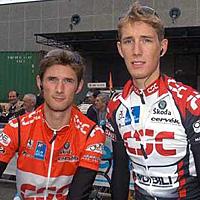
|
Anyway, I finished the race and in one of the last stages, a mountain stage up the Feldberg, I was almost okay again. After I got over that illness, I wanted to make up for what I had missed in Germany, so my motto was to give it all at the end of the season, and that went really well. I also wanted to confirm my abilities after a very good season start with the Giro and especially the Tour de Suisse, so I really dug deep for the last three races, doing some training behind the motorbike with my Dad and brother, and it was a success. I didn't realise what I'd done at the time, but now - going back into training after a break of 4-5 weeks, you ask yourself: did I ever ride that fast?
CN: Which of your performances this year rates highest for you personally?
FS: Hmmm…actually, all of them. At the Tour de Suisse, I should have been on the podium [Schleck finished fourth, five seconds behind Jan Ullrich]. But another really important race for me was the Giro, because riding 100 per cent for Ivan was also a beautiful experience. To know that I was the last man with him on the climbs was really important for me; it was very satisfying and I learned a lot. And yes, of course, Zürich is one of my greatest achievements so far. Two years ago, I wouldn't have even dreamed about a situation like that. Only one guy left in front of me, and it's Bettini. We all know how good Bettini is… he's one of the greatest! And then that last race, the Giro di Lombardia, it's legendary. For me, it's part of the myth in cycling, together with races like Liège-Bastogne-Liège. Every rider has his own preferences, but for me, Lombardia is the greatest race [Schleck finished third in 2005, losing a three-man sprint to Gilberto Simoni and Bettini].
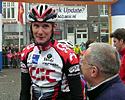
|
CN: So tell me about your family. Your father, Johnnny Schleck, was a pro in the 60's and 70's with the Luxemburg national team and with Bic [riding with Luis Ocaña and Tour de France-director Jean-Marie Leblanc], and your younger brother, Andy, is also with Team CSC...
FS: It's in the family, yes. My Dad rode the Tour de France eight or nine times [eight times, one abandon- ed.], so I was immersed in it since I was a child. My older brother Steve started racing, too, but I was too small so I came to the races to support him. But I always thought that his way of racing wasn't smart, so I had to prove it to him that I could do a better job…[laughs] So I started racing aged 13. And little by little, I grew into the sport, dreaming of course to become a pro, but I didn't really think of that. Andy started the same way. Steve has stopped now - he's moved into politics. But my Dad never pushed us towards cycling. He wanted us to do some sport, because it challenges you and imposes a certain discipline on you once you aim to become better at it. It was important for him that we didn't hang around on the streets, and sport is a good way to focus.
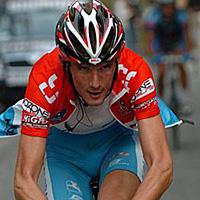
|
I've always dreamed about becoming a pro, and now that that's achieved, I continue to dream about other goals. I think that it's important to never stop dreaming. Because if you do, you don't set yourself any more objectives. I always think of greater goals, and I believe I can still improve my performances. It helps a lot to be part of a team where everything works perfectly, where I've found great team mates and good friends. Another factor is that my brother is in the team, too, so I think I'm very lucky in this situation, because everything fits together, and that's an enormous advantage.
CN: Tell me about your path from the amateur days to that pro contract with CSC.
FS: After finishing high school, I entered the Luxemburg military sports programme and could focus on cycling only. Then I had a difficult time in Italy, with De Nardi, where nothing seemed to turn out right. I changed to Festina as a stagiaire in 2001, but after that season they stopped, so that was disappointing, too. 2002 was my last year as an Under 23; I was with French Elite 2 team Chateauroux at the time and I said to myself that if I didn't succeed that year, I'd go back to school - I was fed up. It was hard also because the French pro teams looked down on me, saying, 'We have 50 guys like you so why should we take you?' But then Bjarne started to believe in me and took me on as a stagiaire the next year - and I think I convinced him that it wasn't a bad idea! It took a while before I could sign a deal, though, because Jan Ullrich was supposed to join the team. He would have taken the place of two or three riders, financially speaking. It's a pity not to have Jan on the team, but on the other hand, it was good luck for me!
CN: How did the link to CSC happen?
"To finish top ten or top five at the Tour would be enormous."-Schleck about his biggest dream |
FS: Bjarne Riis and Kim Andersen were in the same club I started out with - ACC Contern in Luxemburg. The president, Marcel Gilles, was the one who made contact with Bjarne. Kim Kirchen, my brother and I are still in that club, so winning the Luxemburg championships was also another great moment for them. It's unfortunate that the Luxemburg media pay very little attention to it. We once had a great rider in the 50's and 60's, Charly Gaul, and I have the feeling that we're at that same level again now in Luxemburg, achieving great results. But the public still focuses on soccer, although we lost 0-4 to Liechtenstein in the qualifications for the World Cup! What's going on? Of course, soccer is the main sport, but it's still a pity the country doesn't know how good we cyclists are. Soccer always gets 8-14 pages in the newspaper, whereas reports on cycling get barely one.
CN: How come a Luxemburger ends up being a great climber, anyway? It's not that Luxemburg has any real mountains, it's more a classics terrain...
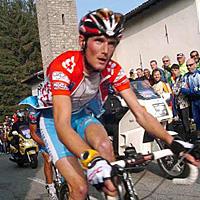
|
FS: Since I was very young, my family went to the Côte d'Azur on holidays, so that's where we rode the longer climbs. But I didn't really train on the mountains specifically, even when I was in Italy. I guess it must be natural talent, and the fact that I haven't got any problems with my weight. On the other hand, my time trial capabilities aren't the best, but I'm working hard on that.
CN: It must be very motivating for you and your brother to race in the same squad. Is there sometimes a little rivalry, too?
FS: No, never. I'm happy about his results in the same way that he is about mine. It's great to be able to train and race together on the same team. Of course, he still has a lot to learn - he can be a bit chaotic, and he's still young…not that I would be that much older, mind you! I've still got a lot to learn as well, but sometimes I can give him some advice on this or that. He needs to find his own way, too - I'm sure that if he stops being so messy…[laughs] he can become a great rider.
CN: You said earlier that you're working on your time trialling now.
FS: Yes, together with Bjarne we already improved my position, but I certainly have a disadvantage because I'm tall, but light [Schleck measures 1.87m for a top form weight of 63-64kg]. So I need to work on my time trialling skills, but when I see Ivan Basso's progress - although I don't want to compare myself to him - I think I should be able to make some progress.
CN: So what are your career goals on the longer term, which way do you want to go?
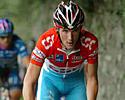
|
FS: I do feel more like a stage race rider than for one-day races. I feel good in stage races; once I've caught their rhythm I recover well. I rode the Giro and the Vuelta, and I came out of both races in good form. When I raced the Vuelta last year, I finished in tenth place at the World's in Verona.
CN: What would be your biggest dream, then?
FS: Of course, every rider dreams about the Tour de France. To finish top ten or top five at the Tour would be enormous. Next season, if everything turns out as planned and I'm not ill or injured or anything, I will ride the Tour for the first time, of course as a helper for Ivan Basso. I hope I can help him win the Tour, and I'm more than happy to put my own expectations aside for him. Ivan is a great teammate, a great person; he shows a lot of respect so my biggest goal for next year is to ride the Tour with him.
CN: Will you be able to shift your personal goals to the second half of the season?
FS: I'll try to race fast early in the season, too. Paris-Nice, like this year, and then the Belgian Classics. If I'm up front in Belgium, then that's good. After a break, I'll be preparing for the Tour de France, but not at the Tour de Suisse. After the Tour, the Deutschland Tour would be interesting again, and the final Pro Tour races, especially the Giro di Lombardia, my favourite.

